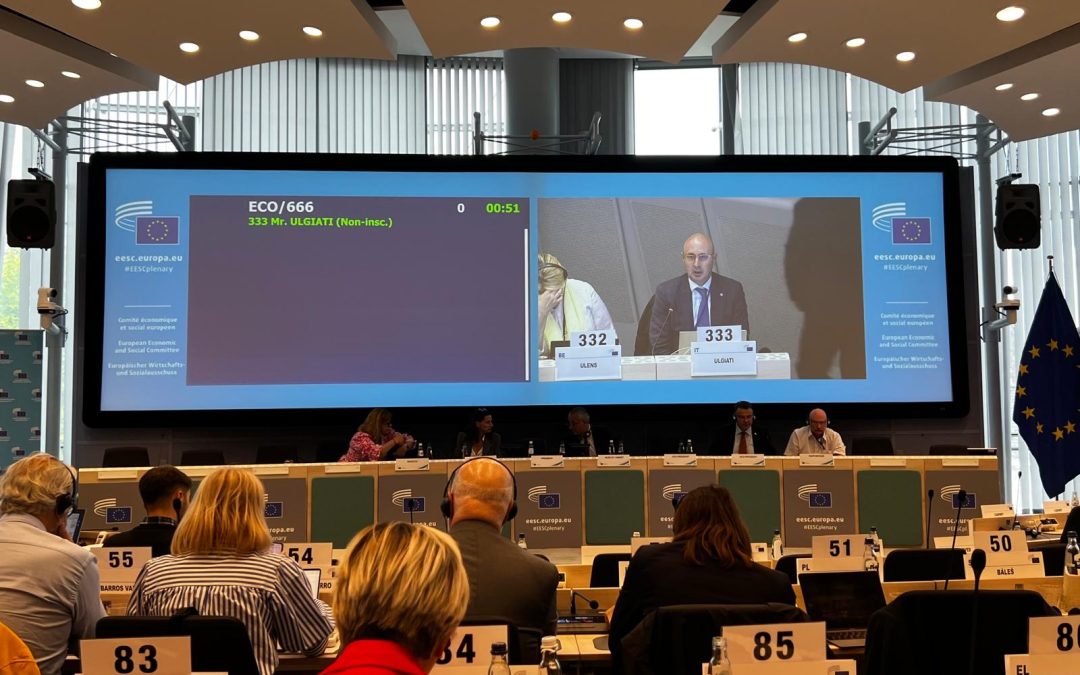CESE, IL CONSIGLIERE ULGIATI ALLA PLENARIA DI BRUXELLES
Il 16 e 17 Luglio si è tenuta a Bruxelles la Sessione Plenaria del Comitato Economico e Sociale Europeo (CESE) ai cui lavori ha partecipato il Consigliere Luigi Ulgiati. Vari e numerosi i progetti di Parere adottati, tra i quali quello molto interessante, ECO/666, relativo a “Il ruolo dei sindacati nel miglioramento della produttività”. I sindacati svolgono una funzione importante nella produttività del lavoro tramite la contrattazione collettiva e gli accordi settoriali, nonché agevolando l’innovazione sul luogo di lavoro, che a sua volta potrebbe aumentare la produttività del lavoro. In tale contesto, il CESE ritiene che la contrattazione collettiva ed il dialogo sociale possano estendersi alla progettazione di nuovi modelli di lavoro in grado di stimolare l’innovazione, come le strutture di team collaborative, la flessibilità dell’orario di lavoro e le iniziative di leadership condivisa. In aggiunta, oltre a sostenere la produttività consentendo ai lavoratori di contribuire al processo decisionale sul luogo di lavoro, fornendo loro le informazioni necessarie e coinvolgendoli in processi efficaci di consultazione, i sindacati potrebbero anche migliorare i risultati aziendali aiutando le imprese a mantenere i lavoratori esperti che potrebbero essere più produttivi. Il Consigliere Ulgiati, intervenuto in merito, ha così dichiarato: «E’ fondamentale il ruolo dei sindacati e di tutti i lavoratori nel miglioramento della produttività. Occorre, quindi, rafforzare il dialogo sociale tra le Parti datoriali e le Parti sindacali, perché questo è proficuo non solo per migliorare la produttività e gli obiettivi delle imprese, ma anche per rendere maggiormente partecipi i lavoratori. A tal fine, sottolineo, che è utile avere normative che facilitano il coinvolgimento dei lavoratori, sviluppando una piena partecipazione agli obiettivi delle imprese. Ciò è sicuramente vantaggioso per entrambe le Parti».
UE: POVERTÀ ESTIVA IN AUMENTO
Secondo una recente indagine di Eurostat le vacanze lunghe per i cittadini europei sono sempre più un lontano ricordo, perché non sostenibili economicamente, con il 27% della popolazione Ue (pari a circa 121 milioni di uomini e donne) che afferma di non potersi concedere neanche una settimana fuori casa. In tale panorama, i dati dell’Istituto di Statistica europeo, vedono l’Italia guidare la classifica dei nuovi poveri. Su tutti spicca il dato tricolore: a fine 2024 il 31,4% degli Italiani dichiarava di non poter andare via di casa per sette giorni, che si traduce in più di 18,5 milioni di persone in difficoltà. Il dato complessivo, pur significativo, evidenzia tuttavia un lento, ma costante miglioramento rispetto agli anni passati, con disparità tra Paesi membri che risultano profonde, a testimonianza di come le disuguaglianze economiche all’interno dell’Unione Europea continuino a riflettersi direttamente sulla qualità della vita e sull’accesso ai diritti sociali fondamentali, come quello al riposo ed al tempo libero. Lussemburgo, Svezia e Paesi Bassi, guidano la classifica degli Stati Ue in cui l’opportunità di trascorrere un periodo di relax esteso è possibile per la maggioranza della popolazione. È importante però non confondere il dato Eurostat, relativo a cittadini europei lavoratori e non, con quello della povertà lavorativa, inerente a quanti, pur lavorando, non guadagnano a sufficienza per potersi concedere ferie prolungate. In proposito, la cartolina dell’estate 2025 ha il volto stanco ed affaticato di oltre 41,5 milioni di lavoratori europei che, nonostante un impiego, non possono permettersi neanche una settimana di vacanza. A rivelarlo, un’analisi dell’European Trade Union Institute (ETUI) sulla cosiddetta “holiday poverty”, la povertà delle ferie in aumento nel Vecchio Continente. Mentre l’élite imprenditoriale trascorre il periodo estivo in resort di lusso (con amministratori delegati che guadagnano oltre 100 volte più di un lavoratore medio) milioni di persone sono costrette a rinunciare alle vacanze a causa del carovita relativo ai trasporti, agli alloggi, al cibo, laddove i salari reali rimangono fermi, oppure diminuiscono a causa dell’inflazione. Per combattere tale grave fenomeno occorre un rilancio della contrattazione collettiva che garantisca non solo stipendi più elevati, ma anche maggiori ferie retribuite, al fine di assicurare condizioni di lavoro e di vita dignitose a milioni di europei.
EN:
EESC, COUNCILLOR ULGIATI AT THE BRUSSELS PLENARY
On the 16th and 17th of July, the European Economic and Social Committee (EESC) held its Plenary Session in Brussels, with the participation of Councillor Luigi Ulgiati. Various and numerous draft Opinions were adopted, including the very interesting one, ECO/666, on “The role of trade unions in improving productivity”. Trade unions play an important role in labour productivity through collective bargaining and sectoral agreements, as well as by facilitating innovation in the workplace, which in turn could increase labour productivity. In this context, the EESC believes that collective bargaining and social dialogue can extend to the design of new working models that stimulate innovation, such as collaborative team structures, flexible working time and shared leadership initiatives. In addition, besides supporting productivity by enabling workers to contribute to decision-making in the workplace, providing them with the necessary information and involving them in effective consultation processes, trade unions could also improve business performance by helping companies retain experienced workers who could be more productive. Councillor Ulgiati, who spoke on the subject, said: «The role of trade unions and all workers in improving productivity is crucial. It is therefore necessary to strengthen the social dialogue between employers and trade unions, because this is beneficial not only for improving productivity and the objectives of companies, but also for making workers more involved. To this end, I stress that it is useful to have regulations that facilitate the involvement of workers, developing full participation in the objectives of enterprises. This is certainly beneficial for both Parties».
EU: INCREASING SUMMER POVERTY
According to a recent Eurostat survey, long holidays for European citizens are increasingly a distant memory, because they are not economically sustainable, with 27% of the EU population (equal to about 121 million men and women) claiming that they cannot afford even one week away from home. In this panorama, data from the European Institute of Statistics see Italy leading the ranking of the new poor. The Italian figure stands out above all others: at the end of 2024, 31.4% of Italians said they could not leave home for seven days, which translates into more than 18.5 million people in difficulty. The overall figure, while significant, nonetheless shows a slow but steady improvement over past years, with disparities between member States being profound, testifying to how economic inequalities within the European Union continue to have a direct impact on the quality of life and access to fundamental social rights, such as rest and leisure. Luxembourg, Sweden and the Netherlands lead the ranking of EU States where the opportunity for extended leisure time is possible for the majority of the population. It is important, however, not to confuse the Eurostat figure, which relates to working and non-working EU citizens, with the in-work poverty figure, which relates to those who, although working, do not earn enough to be able to take extended leave. In this respect, the postcard of summer 2025 has the tired and weary face of more than 41.5 million European workers who, despite being employed, cannot afford even a week’s holiday. This was revealed by an analysis of the European Trade Union Institute (ETUI) on the so called “holiday poverty”, which is on the rise in the Old Continent. While the business elite spends the summer period in luxury resorts (with CEOs earning more than 100 times more than an average worker) millions of people are forced to give up their holidays because of the high cost of transport, housing, and food, while real wages remain stagnant, or fall due to inflation. To combat this serious phenomenon, we need a revival of collective bargaining that guarantees not only higher salaries, but also more paid holidays, in order to ensure decent working and living conditions for millions of Europeans.
UGL NEWS dall'EUROPA n. 135 del 18 Luglio 2025
EN - UGL NEWS from EUROPE n. 135 -18th of July 2025 -



